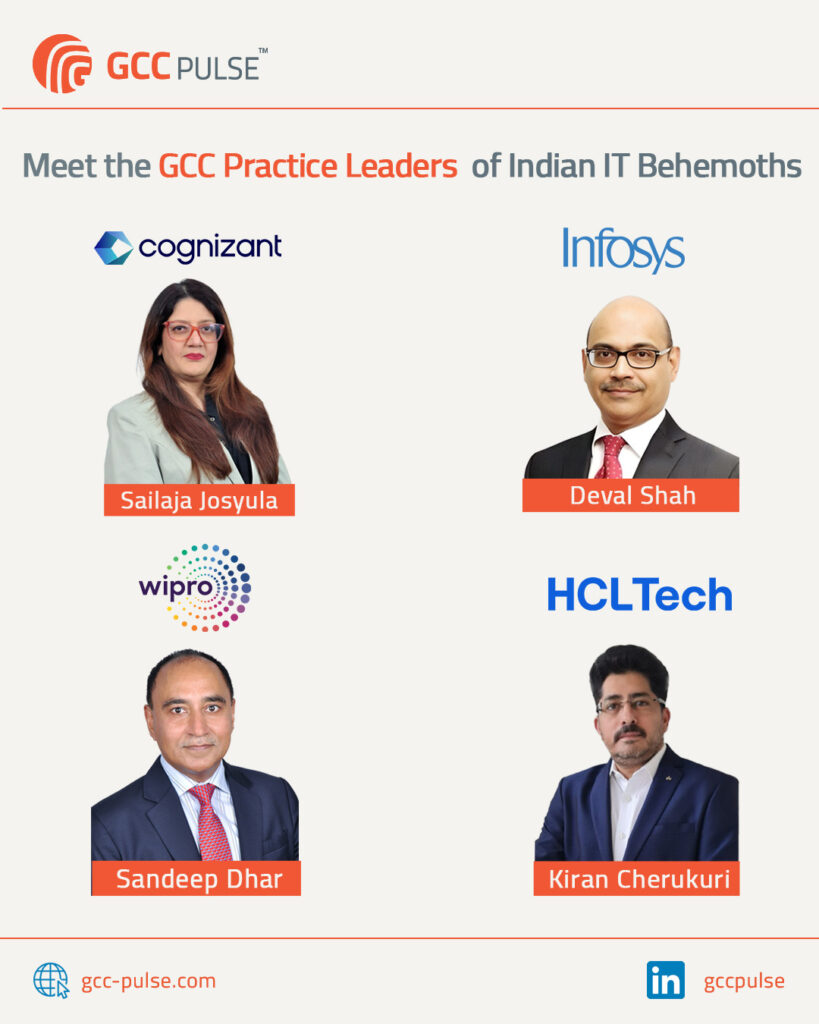
HCL Tech announced last month that Kiran Cherukuri was being appointed as the head of the GCC business. Business daily Mint reported that Santosh Jha is being appointed as the GCC head for Tech Mahindra, which has not been confirmed by the company. The ball had earlier been set rolling with Infosys, Wipro, and Cognizant having made similar announcements in the last couple of weeks.
For India IT service behemoths, it may well be an opportunity not to be missed. The rise of the in-house innovation centres that perhaps create some intellectual property has been on their radar. The contours of a partnership between technology services and leading GCC companies could now be emerging. The change also confirms the importance of GCCs for the IT services industry and how it could fuel growth for them. Industry watchers say the new era of India’s IT companies and GCCs working together could be emerging.
The opportunity could be turning out to be a match made in heaven. The proverbial stars need to align to make sure both sides can count on each other. The Indian centres of global companies seek fresh avenues for growth, while IT services companies need to serve the process and technology needs of the GCCs.

GCCs have been a hot property, and the industry earned revenues of $64.4 billion during 2024-25, registering a growth of nearly 10 percent CAGR. The juggernaut looks set to roll on.
Intellectual Property – The Rush for the Holy Grail
If there is one word that catches the attention of both sides, it is the two-letter word – IP. For the GCCs, which is a few thousand in headcount, that could throw up a new challenge for its people.
In the rapidly evolving world of plug-and-play, is it possible for IT services companies to provide plug-and-play tools? The hushed question, then, can GCCs and IT services companies develop vertical or domain-focused tools that could be developed into IPs? Remember how some of the largest IT services companies evolved with their financial services products, for example?
Some questions that the two sides face may not have clear answers. The opportunity to create the IPs is a challenge that is bringing competitors together. Given the rapidly changing situation on the ground, ownership of the IP will be closely monitored. Can the two sides work as a consortium is a million-dollar question. The ownership of the IP could decide the winner in this high-stakes opportunity. The relatively small companies are now joining the GCC race.
“Mid-tier IT firms like Coforge and Happiest Minds are becoming embedded partners to GCCs—offering talent, compliance, GenAI capabilities, and ongoing operational support under BOT and co-managed models,” says Nitika Goel, Managing Partner and CMO, Zinnov.
New Cities, Newer Opportunities?
GCCs are looking to spread out new centres in search of talent. IT services companies, which have traditionally driven growth with headcount, could be expected to follow suit. Without a team that can drive that task across processes and market opportunities, moving to new centres may fall short of creating the desired value.
The IT services companies see revenue from potential GCC partners as stable and perhaps annuity revenue. Monetising this revenue opportunity from their India operations could be the biggest challenge for GCCs, and partnering with the IT services companies offers hope. As the question rings louder on the number of IPs developed through the year, GCCs and IT services companies could end up finding being BFFs a better option than being on opposite sides of the table.
IT Services & GCCs Are Nodes in the Same Value Network: Zinnov’s Nitika Goel
GCCs are no longer just execution arms. They have become innovation hubs, focused on IP creation, verticalized solutions, and next-gen capabilities in AI, cybersecurity, and platform engineering. At the same time, Indian IT services companies are shifting from pure delivery roles to becoming strategic collaborators, bringing external scale, domain best practices, and increasingly, co-investment in platforms and R&D. This evolution is driven by necessity. Enterprises need to innovate faster and at scale, which demands deep domain knowledge, access to quality data, and robust engineering talent—capabilities that GCCs and service providers collectively bring to the table.
Recent examples reinforce this shift. The Capgemini–Dai-ichi Life engagement illustrates how BOT (Build-Operate-Transfer) Models are being used not just for setup but for co-creating AI, data analytics, and cybersecurity solutions tailored to markets in Japan, the US, and Australia. Similarly, GE’s Bangalore GCC partnering with Infosys to develop the GridOS industrial platform showcases how industrial domain expertise and tech execution strength can come together to build scalable, co-owned platforms.
GCCs and IT services firms are no longer on opposite ends of the spectrum. They are now nodes in the same value network—one driving depth, the other delivering scale. Coopetition isn’t a compromise; it’s the new calculus of innovation.






